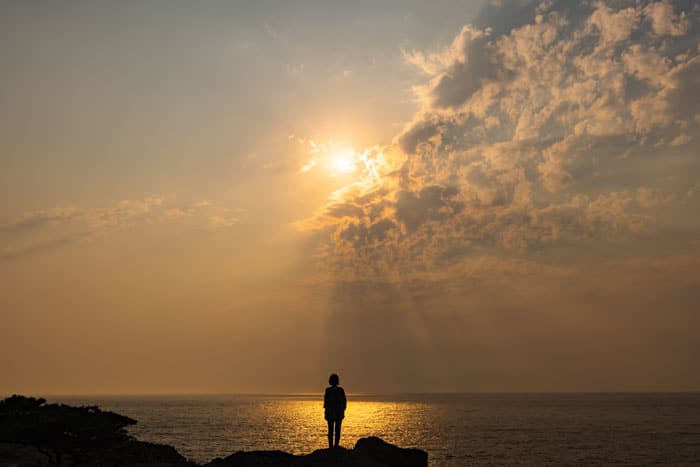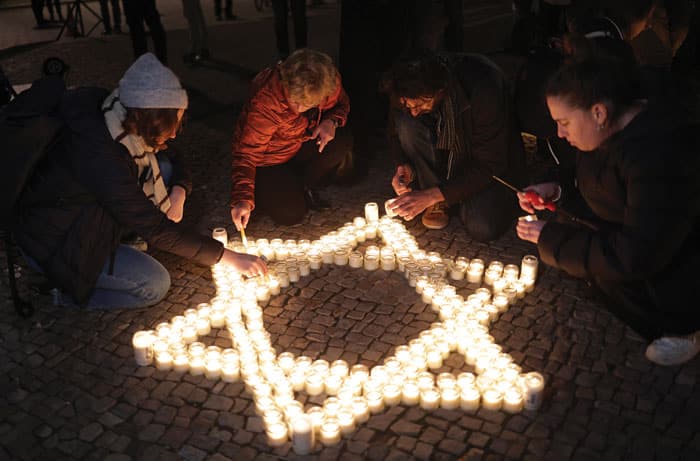 Susumu Yoshioka/Getty Images
Susumu Yoshioka/Getty Images Gratitude is one of those easy cliches. No matter how rough life gets, we can always find something to be thankful for. I remember how during the long, anxious months of COVID lockdowns, when physical health could hardly be taken for granted, I would often wake up in the morning and say, simply: I’m really glad my lungs are working.
But I also remember feeling guilty about expressing such gratitude. Tens of thousands of people were dying across the country, because their lungs stopped working, and here I was reminding myself that I was so much more fortunate than they were.
It felt wrong, or at least selfish.
We’re in a similar situation today, when we are faced with two clashing events: the darkest moment in modern Jewish history and the festive holiday of Thanksgiving. The former compels us to grieve, while the latter compels us to express gratitude.
How is it possible to express gratitude when the images of the massacres have imprinted themselves on our consciousness, and no matter how hard we try, we can’t erase them because they are too graphic, too cruel, too painful?
But how is it possible to express gratitude when more than 1200 innocent souls were butchered on that infamous “Black Shabbat” of Oct. 7?
How is it possible to express gratitude when the images of the massacres have imprinted themselves on our consciousness, and no matter how hard we try, we can’t erase them because they are too graphic, too cruel, too painful?
How can we forget the hostages? How can we forget, even for a few hours, the parents and grandparents and siblings and friends and other relatives of the more than 200 captives languishing in Hamas hell at this very moment?
And as part of the darkness that has emanated from Oct. 7, I am certainly not excluding the tragedy of so many Palestinian lives lost. I grieve those losses as well, made even more tragic by the fact that the evil barbarians of Hamas use their own people as human shields.
I haven’t even mentioned the alarming rise in Jew hatred that is spreading anxiety throughout much of American Jewry, especially on college campuses. If Jews are feeling anything right now, it is fear, not gratitude.
Given the bewildering hostility that is hitting us from all sides this Thanksgiving, can we still honor this unique and festive American tradition? Is there anything in our own tradition that can help us navigate through these emotionally treacherous times?
One of the mystical aspects of the Jewish tradition is the concept that time can transcend space. Space represents the physical dimension; time represents the spiritual dimension.
The ultimate example of this phenomenon is Shabbat.
“Judaism is a religion of time aiming at the sanctification of time,” Rabbi Abraham Joshua Heschel wrote in his classic book, “The Sabbath.”
No matter what happens to us in the realm of space, “Judaism teaches us to be attached to holiness in time, to be attached to sacred events, to learn how to consecrate sanctuaries that emerge from the magnificent stream of a year. The Sabbaths are our great cathedrals; and our Holy of Holies is a shrine that neither the Romans nor the Germans were able to burn.”
A cathedral of time that no enemy can burn is a powerful notion that has sustained the Jewish people for millennia.
Entering that cathedral, however, is not always easy. I can only imagine the traumatized souls in Israel who tried to enter that cathedral of time on the first Shabbat after Oct. 7. How could they? We’re human, after all. Shabbat or no Shabbat, our minds are still burning with images that pierce our hearts.
This is why I appreciate the concept of a time-out. We’re not abandoning anything. We enter the realm of time for a short while and tell the realm of space, “We’ll be right back.”
We can approach Thanksgiving, then, with that “time-out” energy, fully aware that the grief associated with Oct. 7 is not going away but is simply put on hold. By suspending the darkness for a brief moment, we are effectively telling the victims of Oct. 7 and the hostages that we’re still with them. We haven’t forgotten you.
We’re also making a statement to the tragedy itself. When we take a time-out for Thanksgiving or Shabbat in the throes of the biggest Jewish calamity of our time, we are telling the event itself that we’ll be right back.
That still leaves us with a Thanksgiving dilemma. Not all gratitude is created equal. How best to express gratitude so soon after Oct. 7? When we go around the Thanksgiving table and ask, “What are we thankful for?” what will we answer?
I’ll share with you what I will and will not answer.
To honor the tragic times we are living in, I will look for blessings that connect to those times. For example, I have never seen the Jews of my community so united. I am grateful for that.
I will try to avoid the physical and personal blessings in my life that I traditionally mention at Thanksgiving. This year is unlike any other. To honor the tragic times we are living in, I will look for blessings that connect to those times.
For example, I have never seen the Jews of my community so united. I am grateful for that.
I have seen so many Jews, including many younger Jews, who have lit up and reconnected with both their Jewish and Zionist identities. I am grateful for that.
I have seen an outpouring of support from countless Jewish organizations to help Israelis in need, from shipping emergency supplies to showing up in person to show love and solidarity. I am grateful for that.
I have seen philanthropists open their hearts and wallets to a whole other level worthy of this unprecedented crisis. I am grateful for that.
I have seen an intense desire among Jews to connect in person with other Jews. I am grateful for that.

I have seen an army of Zionist influencers who have been working around the clock to make the case for Israel on social media. I am grateful for that.
I spoke to someone high up in Israel recently who told me that post-Oct. 7, the national mission will be to rebuild the country even stronger and better than pre-Oct. 7. I am grateful for that.
I recall how during the first 10 months of 2023, Israeli society went through the biggest civil strife of its history, and how unity and solidarity are marking the current moment. I am grateful for that.
I am seeing the thousands of Jews and others around the world who are calling for the release of the hostages, whether through posters, street marches or creative installations. I’m grateful for that.
I saw nearly 300,000 people in Washington, D.C. march in solidarity with Israel on Nov. 14, with pride and without harshness. I am grateful for that.
I have seen the shows of support and empathy from non-Jews across the country who understand the unique danger facing Jews. I am grateful for that.
There is always controversy when it comes to support from the United States. I will only say this: The support for Israel in the U.S. Congress is still strong, and President Biden has a bond with the Jewish state that transcends politics. I am grateful for that.
I have seen the many activists across the country who are working to strengthen support for Israel among our elected officials at all levels. I am grateful for that.
I have seen the legal activists who have taken the gloves off to get universities to better protect Jewish students. I am grateful for that.
I have seen the security initiatives that have sprouted to protect Jews and Jewish spaces. I am grateful for that.
I have seen the poets, the musicians, the artists and the comedians who are expressing their love in their own creative ways. I am grateful for that.
I have seen the Israeli news outlets that are covering every aspect of this ongoing tragedy and the reporters who are risking their lives in Gaza. I am grateful for that.
I have read the stories of the unsung heroes, first responders and brave warriors in Israel who have saved countless lives since Oct. 7, including the soldiers now fighting in Gaza. I am grateful for that.
I have seen rabbis and other spiritual leaders who are finding ways to nourish our depleted souls. I am grateful for that.
As you go through your own time-out for gratitude, with the victims and hostages and all Israelis in our hearts, and with the Jewish nation still grieving, I encourage you to find your own ways to be grateful. There are plenty.
As for me, perhaps my biggest thank you is simply that I am a Jew.
Happy and meaningful Thanksgiving.























 More news and opinions than at a Shabbat dinner, right in your inbox.
More news and opinions than at a Shabbat dinner, right in your inbox.